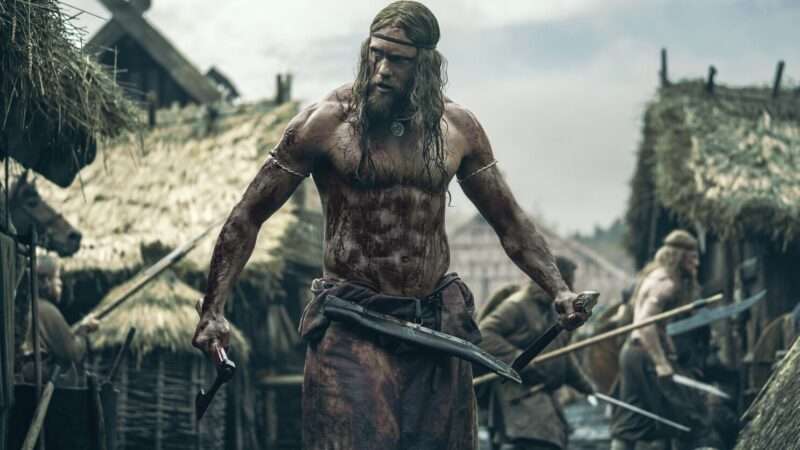
To understand The Northman, a bloody, brilliant, brutally bonkers Viking revenge epic based on the Icelandic folktale that inspired Hamlet, it is worth reflecting briefly on the world of journalism.
For the last several years, the news media has debated a question of both professional ethics and practice: Should journalists offer judgment on their subjects? Or should they seek to portray those subjects as they see themselves, allowing readers insight into their subjects’ mindsets and motivations, and leave the judgments to others?
The most resounding call for judgment came from Pulitzer Prize winning journalist Wesley Lowery, who has pushed news media to write with what he calls “moral clarity” in contrast to “neutral objectivity,” which, he argued in 2020, “trips over itself to find ways to avoid telling the truth.” Lowery is a sharp reporter whose work has benefited the public; his Pulitzer was for an innovative project tracking police shootings. There is much to admire in his crusade against the pretense of journalistic neutrality, an impossible standard even when attempted earnestly. But too often the quest for moral clarity has merely led to dull and predictable editorializing in the midst of articles that purport to be straight news.
Something similar has been happening in Hollywood, arguably even before it became a debate in journalism, particularly with movies and TV shows that take place in the past. There is a tendency not only to see previous eras through the lens of today’s cultural and political debates, but to moralize and speechify about the sins of the past, often by applying contemporary standards and values to times and places that would not have understood them. The lesson is almost always the same, and it is almost always smug and self-satisfied: The past was full of sin and callousness; thank goodness today’s enlightened moderns know better.
That’s fair enough, in some ways: Just-so stories have always been used for moral instruction, and there’s no way to truly escape the tyrannical perspective of one’s own present. Lots of people (though not me) seem to enjoy a stirringly righteous monologue in which a wrongdoer is made to understand the error of his ways, even if its content or existence makes no historical sense.
But one thing that fiction—movies, novels, television shows, and so forth—can do is help readers and viewers understand the mindset of primitive eras by attempting to portray the practices of those eras as they were understood at the time rather than as we understand them now. In this approach to storytelling, the goal is to avoid casting judgment or imprinting modern values onto historical societies. It is to portray another time, another place, another people not as we might see them now, but as they saw themselves.
Hence, The Northman, director Robert Eggers’ tale of Viking revenge. Eggers’ 2015 debut, The Witch, was an intensely realistic, historically accurate horror fable that brought viewers into the lives of 1600s New England settlers who understood the world as a dark and mystical place filled with magic and menace. Mysticism was not some elaborate quasi-technological overlay on top of nature, like a Dungeons & Dragons spell; it was simply part of nature, like birds or flowers or clouds or volcanoes. And thus a very different moral universe applied.
In The Northman, Eggers once again delivers the same sort of obsessively researched period detail, but this time as a far grander spectacle, as he burrows into the bloody, spirit-haunted world of pre-modern Viking culture.
It’s a mystical and barbarous world of gods and demons, in which nature is a source of awe and mystery that can only be understood as an enchanted force with a personality of its own. Raucous, bizarre, often violent rituals, many of which Eggers stages with painstakingly accurate detail, are a source of interpersonal ties and a method of attempting to control nature’s fiendish mysteries. Kin and clan relationships are all-consuming. And life is short and expendable, especially to Viking warriors, who view themselves as beasts as much as men. Thus they are subject to the same natural law, which means killing and pillaging and otherwise taking by force for glory, necessity, and amusement, sometimes all at once.
It is brutal and abominable and appalling. Yet while the movie depicts scenes of abject horror—at one point, following a raid on a town, the protagonist’s band of warriors set fire to a hut locked full of townsfolk—it offers no judgment, no lecture, no wink to modern mores, no inevitable comeuppance for the perpetrators. They did not see themselves as abominations committing atrocities, but as a pack of man-wolves with just as much right as any wolf pack to prey on the weak. The movie shows them as they saw themselves.
The Northman, then, is a movie that lacks what you might call moral clarity. Is it truly neutral and objective? Probably not. How could it be? But it renders no obvious judgment on Viking horrors except the judgment that the Viking warriors rendered on themselves.
And it’s not only a better movie for it, it’s a more truthful one—or at the very least, a more useful one. For The Northman attempts to engage us with a culture and mindset we don’t already know, one that’s difficult and strange and alien and abhorrent, rather than comfort us with what’s familiar.
The post <i>The Northman</i> Is a Bloody, Brutal, Brilliant Viking Revenge Epic appeared first on Reason.com.
from Latest https://ift.tt/PU7tIjA
via IFTTT